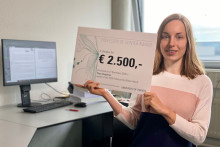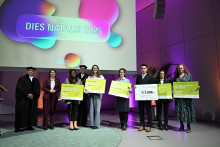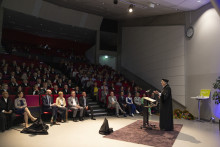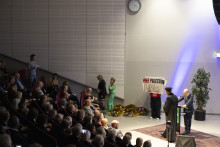The prize
'I think it is a very nice recognition. I like what I do very much, I don't necessarily need recognition for that. But this is a great honour. And this prize is a very positive way of putting women in science in the spotlight. Certainly in my field, mathematics, we are in the minority. But we are definitely there, and I also hope to make people enthusiastic about the field. After all, mathematics is more than formulas and equations. It is also logic, networks, investigating and providing evidence. So it is incredibly broad.'
The career
'2020 is a crazy year. Despite the pandemic, I have some highlights to look back on. In January, I had a son, and recently I received a Veni. And now this prize. In my research, I look at networks from a mathematical point of view. As a mathematician you look at the world in a very abstract way. For example, a network - whether it is in your brain or in the algorithms of Netflix or Instagram - is nothing more than dots connected by lines. I mainly investigate the underlying models of these networks. We make mathematical network protocols that scientists can use to compare data sets. In this way you create a kind of standard to see whether or not you have gold in your hands with your specific dataset.'
The plans
'If it's possible again, I would like to go abroad for a longer period of time, to build collaborations. That is what I would like to use the prize money for. I would prefer to fly to Boston as soon as possible, as I was actually planning to this year.'
The Professor de Winter Prize
The Professor De Winter prize, named after the late professor who passed away in 2005, is an international publication prize for top female talent. The prize money of €2,500 is intended as an incentive to further develop an academic career. This year the prize was awarded for the fourteenth time.
Clara Stegehuis is an assistant professor at the Mathematics of Operations Research department of the EEMCS faculty. She received the award for her paper 'Optimal subgraph structures in scale-free configuration models', which was published in Annals of Applied Probability.
The prize
'When I heard I won, I couldn't believe it. I feel honoured! It has been exactly one year since I obtained my PhD. Cum laude, yes. How I managed to do that? When things are going well and you have the right people around you, that motivates you enormously and beautiful things arise. I do need pressure and a deadline to perform, but then I do everything I can to get it right and take it an extra step further. It is also special for me that I receive this prize for the completion of my PhD research, because I received a grant and prize (the TGS Award, ed.) from the UT in 2015 to be able to start this research.'
The career
'My research revolved around the development and application of algorithms to better understand the behaviour of stent grafts in the aorta. In 10 to 20% of patients, the stent graft does not function properly in the longer term, which is dangerous for the patient and often requires surgical intervention. Both the body and the stent graft are subject to change. Think, for example, of a widening of the aorta or thinning of the vascular wall. Or metal fatigue in the graft due to the constant movements caused by the blood flow. During my PhD I mainly focused on one patient group. In the meantime, several clinical studies are running in national consortia. As a result of this research, the information for vascular surgeons and the industry is less concise, so that hopefully in the future we will be able to treat patients with an aneurysm better and prevent failure of the stent grafts. I am partly indebted to another former UT PhD student, Almar Klein, who, in earlier research, created algorithms on which I was able to build.
I am now technical physician and project leader of the medical 3D lab of the Medisch Spectrum Twente (MST) hospital. All academic medical centres already have such a lab; we are the first top clinical hospital in the region to set up a 3D lab. There are many opportunities in the medical field and we work closely with the academic centres in this area.'
The plans
'I think this prize money is free to spend, but I do not yet have any concrete plans. After my promotion I went straight to work at MST. I think I will use the money to take time out and enjoy myself with my family. And with my neighbours and friends. If it's possible again.'

The Overijssel PhD Award
Every year, the Overijssel PhD Award goes to a PhD student who wrote a 'dissertation of outstanding scientific quality', which can be seen as the start of a promising scientific career. The prize, €5,000 and a certificate, is made possible in part by the Province of Overijssel.
Maaike Koenrades completed her master's degree in technical medicine cum laude in 2014. In 2019 she obtained her doctoral degree cum laude for her thesis titled 'On evaluating stent-artery interaction in abdominal aortic stent grafting'.
The prize
'I remember being interviewed by two jury members and forgetting to ask when I would hear the results. Eventually the liberating words came a week later, coincidentally when I was at the Dutch Design Week in Eindhoven to present our project at one of the exhibitions focused on sustainability. I had to hold back my joy a little. I managed to do that with the greatest difficulty!
I think it's a special prize and a special person. Marina van Damme is an inspiration for me to chase your dreams and not let the annoying voices in your head hold you back.'
The career
'I am one of the managing directors and co-founder of TORWASH, a spin-off of TNO named after the technology that we developed. We focus on sludge from sewage water. We have a processing problem with that in the Netherlands. Every year we produce 1.5 million tonnes of this sludge. Normally this is transported to incinerators in trucks, which is extremely expensive and totally unsustainable. The solution we offer water agencies is to reduce the total by 85% by removing the enormous amount of water from the sludge and processing the sludge itself into biofuel pellets.
We successfully completed the first pilot, which we carried out in Almere, at the end of last year. The company was founded in January. Now it is a matter of scaling up. The first pilot was at fifty litres per hour. We hope to start scaling up to 500 litres per hour at the beginning of next year and demonstrate the full scale of 5000 litres per hour in 2024.'
The plans
'I can put this scholarship into a nice business course at the Nyenrode Business University. I already had an intake and hope to be able to start in January. My background is technical, which is why I want to be able to improve my management skills in order to push TORWASH further forward.'

The Marina van Damme scholarship
The Marina van Damme scholarship goes annualy to a UT alumna, who receives a sum of €9,000 and an award. The money is intended for career development. Marina van Damme received her first doctorate from the then Twente University of Applied Sciences in 1965.
Pavlina Nanou completed her master's degree in Chemical Engineering in 2007. She obtained her PhD in 2012. She is currently working at TNO and her spin-off TORWASH BV.
Another former UT PhD student, Annemieke Konijnendijk, was awarded a runner-up prize of 2500 euros. Konijnendijk obtained her PhD at the UT in 2018 at the BMS department of Health Technology & Services Research. She is now a postdoc at the EEMCS department of Biomedical Signals and Systems.






